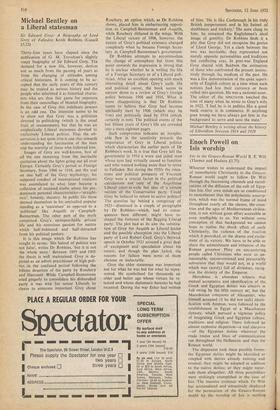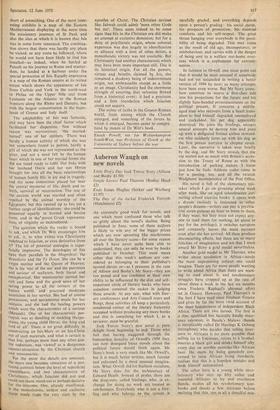Enoch Powell on Isis worship
Isis in the Graeco-Roman World R. E. Witt (Thames and Hudson £3.75)
Whoever wishes to understand the impact of monotheistic Christianity in the Gracco- Roman world ought to follow Dr Witt through the fascinating channels and ramifi- cations of the diffusion of the cult of Egyp- tian Isis. Our own minds are so conditioned to monotheism that the polytheistic assump- tion, which was the normal frame of mind throughout nearly all the classes, the coun- tries and the ages of Mediterranean civilisa- tion, is not without great effort accessible or even intelligible to us. Yet without some conception of that background we cannot hope to realise the shock effect of early Christianity, the violence of the reaction which it provoked, or the drama and excite- ment of its victory. We have to be able to share the astonishment and irritation of the Roman governor Pliny on encountering people called Christians who were so un- reasonable, unconventional and presumably subversive that they would not, in a world which was (surely) full of divinities, recog- nise the divinity of the Emperor.
Herodotus is abundant witness that mutual acceptance and identification of the Greek and Egyptian deities was already in full swing by the fifth century BC; but the Macedonian conquests of Alexander, who himself accepted (if he did not seek) identi- fication with Ammon, were followed by the establishment in Egypt of a Macedonian dynasty, which pursued a vigorous policy of integrating Greek and Egyptian culture, traditions and religion. There followed an almost explosive dispersion—a real diaspora —of the Egyptian deities whenever the trade routes and lines of communication ran throughout the Hellenistic and then the Roman world.
The dispersion took three possible forms: the Egyptian deities might be identified or coupled with deities already existing and revered; they might be adopted in addition to the native deities; or they might super- sede them altogether. All three possibilities were strikingly exemplified in the case of Isis. The massive evidence which Dr Witt has accumulated and attractively displayed for the permeation of the Graeco-Roman world by, the worship of Isis is nothing
short of astonishing. One of the most inter• esting exhibits is a map of the Eastern Mediterranean displaying at the same time the missionary journeys of St Paul, and also the sites at which it is known that Isis was in some form venerated. The combina- tion shows that there was hardly any place he visited, or any route he followed, where he would not have been likely to find Isis installed—as .indeed, when he landed at Puteoli on his journey to Rome and martyr- dom, he landed at a harbour under the special protection of Isis. Equally impressive is a map of the Roman empire at its widest extent which shows the appearance of Isis from Carlisle and York in the north-west to Philae on the Upper Nile and from Lusitania on the Atlantic to the Roman frontiers along the Rhine and Danube, but with the largest concentration in the heart- lands of Greece and Italy itself.
The adaptability of Isis was fantastic, and may have been the chief factor which facilitated her dispersion. Not without reason was myrionymu.s, 'the myriad- named', one of her epithets. There was hardly a human activity of which she was not somewhere found as patron, hardly a gift of which she was not represented as the giver, and not a need felt by the human heart which in one of her myriad forms she did not stand ready to fulfil. Her links with her husband Osiris and her son Horus brought her into all the basic relationships of human family life, in joy and in tragedy, and the same connection placed her near the central mysteries of life, death and re- birth, survival or resurrection. The rest of the ancient world was startled and often repelled by the animal worship of the Egyptians; but this opened up to Isis yet a further range of identifications: she could be presented equally in horned and bovine form, and in the' purest Greek representa- tions of virginity or matronhood.
The question which the reader is bound to ask, and which Dr Witt encourages him to ask, is, to what extent was Christianity indebted to Isiacism, or even derivative from it? The list of potential analogies is super- ficially impressive. The doxologies of Isis have their parallels in the Magnificat, the Benedicite and the Te Deum. She can be a virgin mother and the Queen of Heaven; she is the 'star of the sea' and the patroness and saviour of seafarers, both literal and metaphorical. Her missionaries carried her cult and fame and the good news of her saving power to all the corners of the known world, and practised moderate asceticism in her service. She had of course processions, and sacramental meals for her initiates, and she had the healing powers which were the characteristics of a saviour (Messiah). One of her characteristic por- trayals was as dandling or suckling Harpo- crates, the young child Horus, the 'king and lord of all'. There is no great difficulty in constructing an Isis-Mary or art Isis-Christ out of such materials, and what is certain is that Isis, perhaps more than any other gen- tile seduction, was viewed' as a dangerous counter-attraction by the Christian church and missionaries.
Yet the more the details are amassed, the more one becomes conscious of a pro- found contrast below the level of superficial resemblance; and two characteristics of Christianity, which Isiacism did not and could not share, stand out as perhaps decisive for the outcome. One, already mentioned, is the monotheistic, unillue and exclusive claim made from the very start by the apostles of Christ. The Christian saviour like Jahweh could admit 'none other Gods but me', There seem indeed to be some signs that Isis in the Christian era did make an attempt at exclusive dominion; but for a deity of polytheistic origin, whose colonial expansion was due largely to identification or alliance with a host of other deities, a monotheistic victory was not available. But Christianity had another characteristic which may have been more important still. This is its historical origin. For all the powers, virtues and benefits claimed by Isis, she remained a shadowy being of indeterminate origin, not embraceable except as a fable or an image. Christianity had the enormous strength of asserting that salvation flowed from a historical event: it had a precision and a firm foundation which Isiacism could not acquire.
The welter of faiths in the Graeco-Roman world, from among which the Church emerged, and something of the forces by which it emerged, become easier to compre- hend by means of Dr Witt's book.
Enoch Powell, MIS for Wolverhampton South-West, was Professor of Greek at the University of Sydney before the war



































 Previous page
Previous page